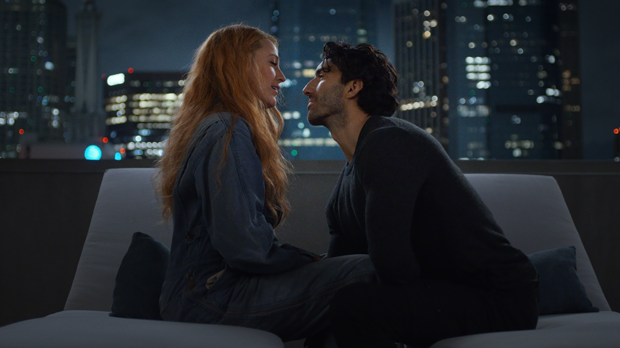 It Ends with Us (2024) Columbia/Drama RT: 130 minutes Rated PG-13 (domestic violence, sexual content, some strong language) Director: Justin Baldoni Screenplay: Christy Hall Music: Rob Simonsen and Duncan Blickenstaff Cinematography: Barry Peterson Release date: August 9, 2024 (US) Cast: Blake Lively, Justin Baldoni, Jenny Slate, Hasan Minhaj, Brandon Sklenar, Kevin McKidd, Amy Morton, Alex Neustaedter, Isabela Ferrer, Robert Clohessy.
It Ends with Us (2024) Columbia/Drama RT: 130 minutes Rated PG-13 (domestic violence, sexual content, some strong language) Director: Justin Baldoni Screenplay: Christy Hall Music: Rob Simonsen and Duncan Blickenstaff Cinematography: Barry Peterson Release date: August 9, 2024 (US) Cast: Blake Lively, Justin Baldoni, Jenny Slate, Hasan Minhaj, Brandon Sklenar, Kevin McKidd, Amy Morton, Alex Neustaedter, Isabela Ferrer, Robert Clohessy.
Rating: ** ½
I didn’t do an official count, but I was one of less than five guys in attendance at the Friday afternoon showing of It Ends with Us, a romantic drama starring Blake Lively (A Simple Favor) as a young woman looking to break the cycle of domestic violence that has followed her all her life. She watched helplessly as her father beat her mother. Now she’s in an abusive relationship with a charming but unhinged neurosurgeon from whom she must extricate herself in order to self-heal.
It Ends with Us opens with its heroine Lily Bloom driving to Maine to attend her father’s funeral. Her mother (Morton, Chicago PD) wants her to say a few words at the service, but she can’t think of a single nice thing to say about the man she saw do unspeakable things. She runs back to Boston where she’s about to open her own business, a flower shop. With a name like Lily Bloom (middle name, Blossom), what other business would she be in?
She’s sitting on a building rooftop contemplating the beauty of the city at night when Ryle Kincaid (played by the film’s director Justin Baldoni) comes bursting onto the scene, throwing steel chairs around in a fit of anger. This should be a huge red flag, but Lily ignores the obvious and falls sway to his charming demeanor. They’re about a kiss when Ryle’s beeper goes off summoning him to the hospital for an emergency. She dodges a bullet, but only temporarily.
One day, Ryle turns up at Lily’s shop. It turns out he’s the twin brother of her only employee, rich and bored housewife Allysa (Slate, Obvious Child). He starts to pursue her romantically. She tells him she doesn’t want to be in a relationship. He persists and eventually wears her down. She thinks she’s found happiness with Ryle, but what they have can’t be called love. He’s controlling and manipulative. She lets him get away with his behavior. She becomes his emotional and physical punching bag.
It’s not like Lily has never known love before in her life. The present-day narrative is interwoven with scenes of teenage Lily (Ferrer) falling in love for the first time with her classmate Atlas (Neustaedter, Colony), a fellow abuse sufferer squatting in an abandoned house across the street from hers. He’s a kind, gentle soul who makes her feel safe. Unfortunately, disapproving Dad makes him go away. That’s not the end of their story.
Just around the time Lily gets with Ryle, she meets Atlas (Sklenar, 1923) again. He now runs a trendy restaurant where Lily happens to be having dinner with her mother and her boyfriend. It’s clear they still have feelings for each other. When Ryle gets wind of it, he becomes extremely jealous. He warns Lily to stay away from her old flame or else. Why does this girl not heed the obvious warning signs? This man is damaged goods.
Adapted from the best seller by Colleen Hoover, It Ends with Us follows a fairly predictable story arc and takes a long time to get there. I knew where it was going at all times. It’s familiar territory even to those of us who don’t gorge on Lifetime movies. There’s one story development having to do with a traumatic event in Ryle’s childhood that isn’t really that surprising. I had a feeling that would be the case. While I don’t mind the predictability of it all, I wish it had been a little more compelling. It’s never a boring film, it just doesn’t pull you into the drama like it should.
Lively delivers a powerful albeit understated performance as Lily. She doesn’t go for histrionics like Bette Davis in anyone of her melodramas. You can see the depth of her silent suffering in the way she carries herself and facial expressions which barely conceal her fear of the man she says she loves. Baldoni likewise keeps it in check as the abusive lover which only makes his violent outbursts all the more frightening. Sklenar has some good scenes as a decent man still in love with his first love. Slate is a fine actress equally adept at comedy and drama. Unfortunately, she’s underserved by the screenplay. I wish they had done more with the mother too.
I can’t say that I love It Ends with Us, but I certainly do admire it. It shines a light on a serious issue without exploiting it. I just wish it spent more time exploring the psychology of the women who get caught up in abusive relationships. That should have been the central focus of the story. It is, after all, a chick flick. Do we really need another domestic abuse drama that tells us why these men are the way they are? It’s a misstep, but not a fatal one. The film’s intentions are good. It obviously cares about its subject. I can’t knock it for that.





